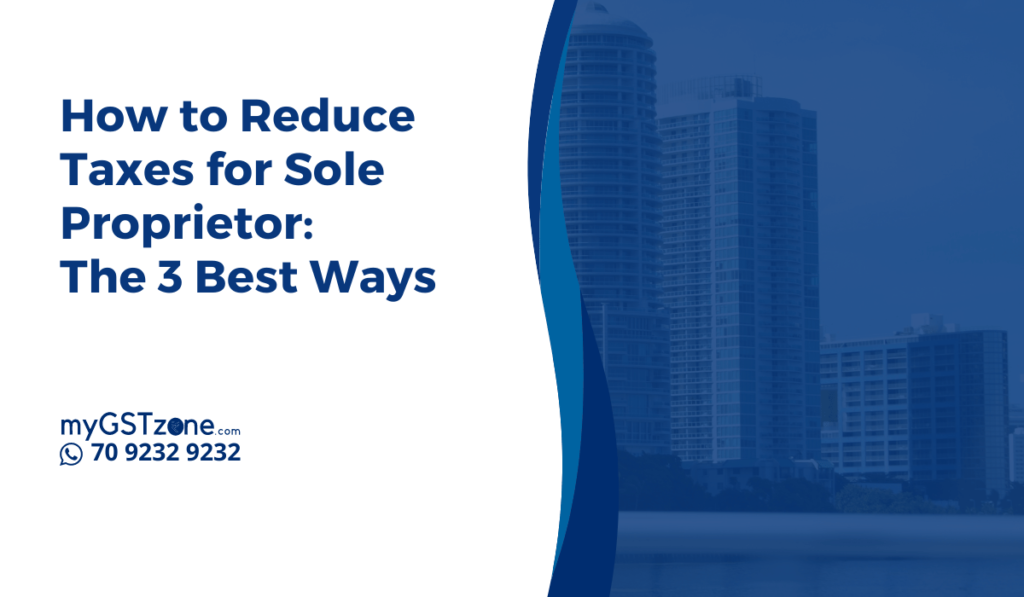Running your own business as a sole proprietor offers a sense of freedom and control. But tax season can bring a different kind of stress! As a sole proprietor, your business income is considered your personal income for tax purposes. This means understanding how to manage your tax burden is crucial for maximizing your profits and achieving long-term financial security.
The good news? There are several strategies you can implement to legally reduce your tax bill. This article will explore the 3 best ways on how to reduce taxes for sole proprietor in India:
- Strategic Expense Management and Deductions
- Leveraging Tax-Saving Investments and Schemes
- Maintaining Proper Records and Compliance
If you are looking for ways to reduce taxes for your sole proprietorship firm, please reach out to myGSTzone.com on 70 9232 9232. They are a Private Limited Company with a rating of 5 stars from more than 800 customers on Google.
By following these strategies, you can keep more of your hard-earned money and ensure your business thrives.
1. Strategic Expense Management and Deductions
Think of your business expenses as investments that not only help your business function but can also lower your tax liability. Here’s how to strategically manage your expenses and maximize deductions:
- Be Smart About What You Spend: Analyze your recurring business expenses – subscriptions, software licenses, utilities, etc. Look for ways to save: negotiate better rates with vendors, explore free or open-source software alternatives, and consider cost-effective options when replacing supplies or equipment.
- Separate Business and Personal Expenses: It’s essential to maintain clear records that distinguish between your personal expenses and legitimate business costs. Only expenses incurred solely for business purposes can be deducted from your taxable income. Examples of deductible business expenses include office supplies, marketing costs, internet fees for business use, and travel related to your business (with limitations).
- Claim Deductions for Legitimate Business Costs: The Indian tax system allows you to deduct a variety of legitimate business expenses from your income. Some common examples include:
- Home Office Deduction: If you dedicate a specific area in your home exclusively for business purposes, you may be eligible to claim a deduction for a portion of your home rent, utilities, and repairs.
- Depreciation: The value of business assets like computers, furniture, and machinery naturally declines over time. Depreciation allows you to deduct a portion of this decline in value from your taxable income each year.
- Business Startup Costs: Initial expenses incurred while setting up your business, like legal fees or registration charges, may be partially deductible (with limitations).
- Health Insurance: Premiums paid towards health insurance for yourself and your family (under specific conditions) can be deducted from your taxable income.
Remember: Always consult with a tax advisor or refer to the latest tax regulations for specific details about deductions and limitations. Maintaining accurate records of your business expenses is crucial for claiming deductions effectively.
2. Leveraging Tax-Saving Investments and Schemes
The Indian government offers attractive investment and savings schemes that not only help you plan for your future but also provide valuable tax benefits. Here’s how these schemes can work in your favor:
- Invest in Retirement Savings: As a sole proprietor, you’re responsible for your own retirement planning. Government-backed schemes like the Public Provident Fund (PPF) and the National Pension System (NPS) offer a dual benefit:
- PPF: This scheme offers attractive interest rates and allows you to invest a fixed amount each year. Contributions made towards PPF qualify for tax deductions under Section 80C, with a maximum annual deduction limit. Maturity benefits from PPF are also generally tax-free.
- NPS: This scheme allows you to contribute a portion of your income towards a retirement corpus. Contributions made towards NPS are deductible under Section 80CCD(1). Additionally, employers’ contributions (if applicable) are also tax-deductible. NPS offers a structured approach to retirement savings and provides tax benefits.
By investing in these schemes, you’ll be building a retirement nest egg while significantly reducing your current tax liability.
3. Building a Culture of Tax Responsibility and Compliance
While not directly reducing your tax burden, building a culture of responsible tax practices and compliance is the foundation for maximizing the benefits of the first two strategies. Here’s why:
- Peace of Mind and Reduced Stress: Knowing your records are organized and your tax affairs are in order offers peace of mind. You can focus on growing your business without the worry of potential tax issues.
- Minimizes Risk of Penalties and Audits: Maintaining accurate and complete records reduces the risk of errors in your tax filing. This minimizes the chance of attracting unwanted attention from tax authorities and potential penalties for non-compliance.
- Builds Trust and Credibility: A responsible approach to tax compliance portrays your business in a positive light.It demonstrates professionalism and builds trust with potential clients, partners, and investors.
Creating a System for Record-Keeping:
- Invest in a Simple Accounting System: Consider using a basic accounting software or a spreadsheet to meticulously record your business income and expenses.
- Organize Your Receipts and Bills: Maintain a system for storing receipts, invoices, and bills related to your business expenses. Digital storage solutions can be efficient for easy retrieval.
- Categorize Your Expenses: Classify your expenses based on their nature (e.g., office supplies, marketing costs,travel expenses). This facilitates claiming deductions efficiently.
Remember: It’s always advisable to consult with a tax advisor for personalized guidance on record-keeping practices and tax compliance specific to your business situation. Reach out to myGSTzone.com on 70 9232 9232 to file the income tax returns of your business. They are a Private Limited Company with a rating of 5 stars from more than 800 customers on Google.
By prioritizing responsible tax practices and building a culture of compliance, you can navigate tax season with confidence and ensure the long-term success and sustainability of your sole proprietorship.


